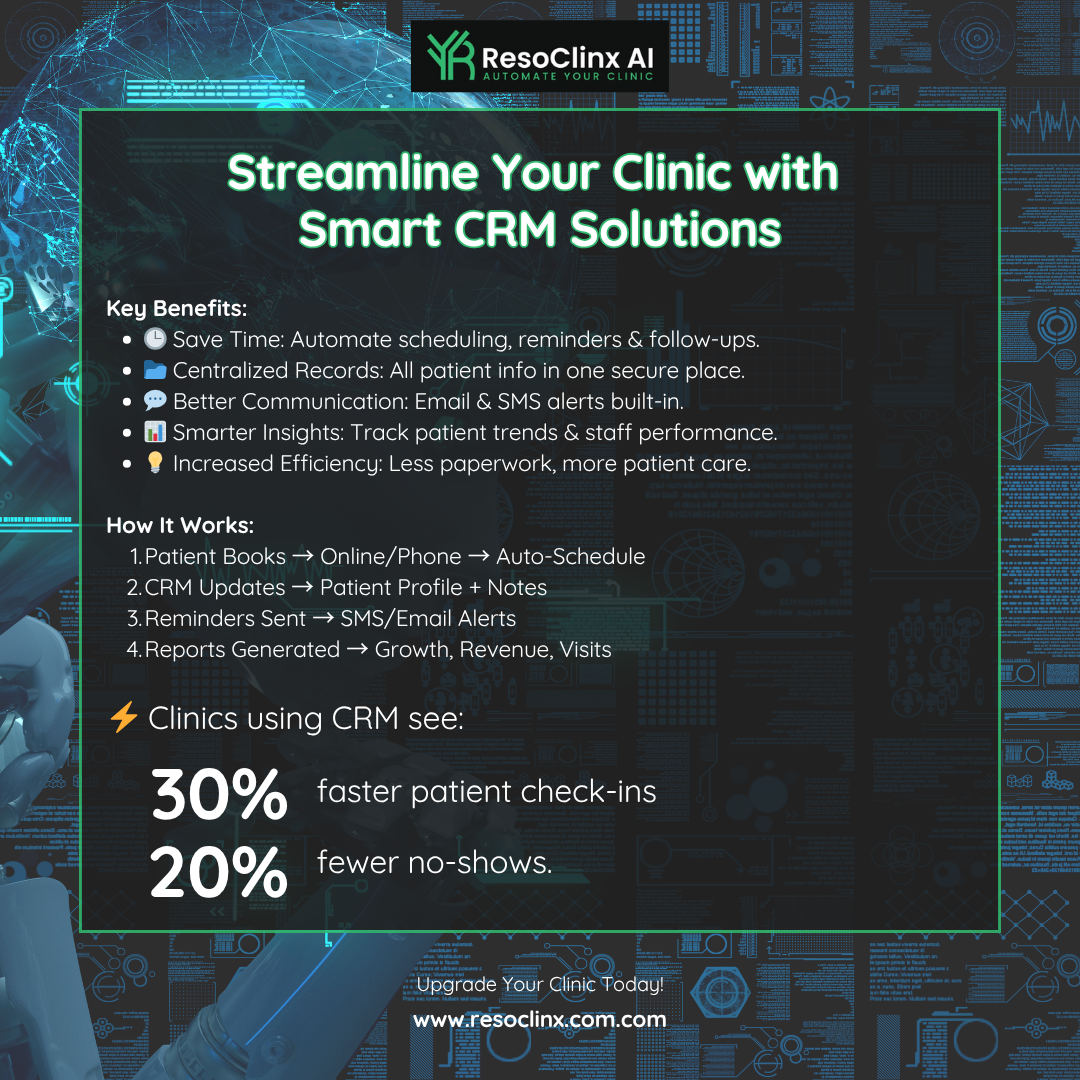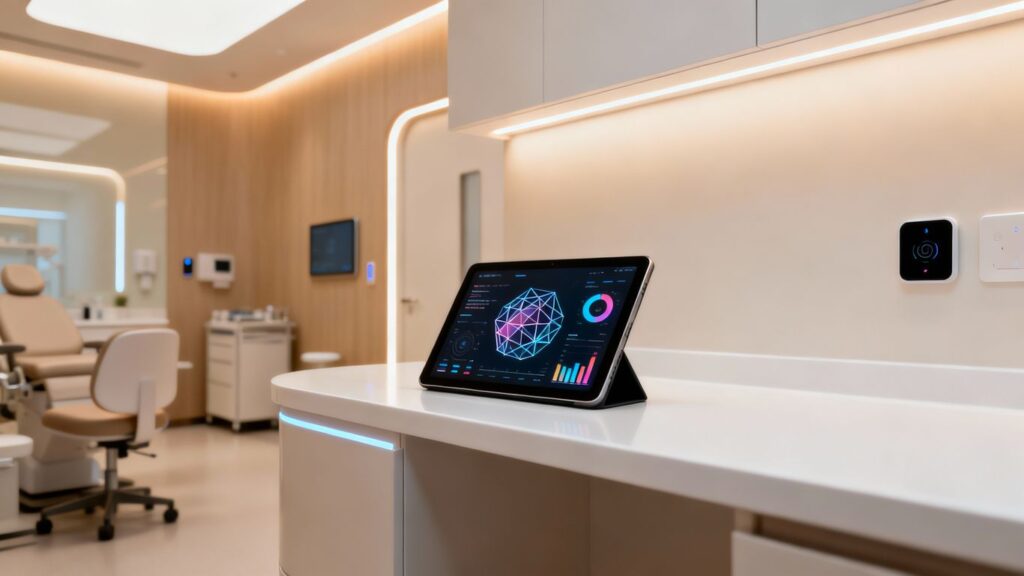Running a thriving aesthetic clinic isn’t just about delivering beautiful treatment results—it’s also about creating seamless experiences that keep clients returning. From managing appointments to tracking treatment plans and nurturing client relationships, the right aesthetic clinic CRM software can make all the difference.
In this post, we’ll explore how a tailored clinic CRM solution can streamline operations, strengthen client loyalty, and ultimately grow your aesthetic practice—without the overwhelm.
Key Takeaways
- Clinic CRM software for aesthetic practices helps streamline client communication, appointment scheduling, and patient records—all in one secure system.
- Look for features like marketing automation, strong data security, and customisable templates.
- Choosing the right software involves assessing your clinic’s needs, checking integration options, and considering future growth.
- Using CRM can convert more leads, keep clients coming back, and provide data for better business decisions.
- Good CRM software improves the patient experience by creating smoother digital journeys and building trust.
Streamlining Operations with Clinic CRM Software

Running an aesthetic clinic often feels like juggling a dozen tasks at once—client bookings, patient records, and marketing campaigns. That’s where clinic CRM software acts as your central command centre, keeping everything organised and efficient.
It’s designed to take the day-to-day administrative load off your shoulders, freeing you up to focus on what you do best – providing excellent patient care.
Centralising Patient Records for Efficiency
Having all your patient information in one place is a game-changer. Instead of sifting through paper files or multiple digital systems, a CRM consolidates everything: contact details, treatment history, consultation notes, and even before-and-after photos.
This unified view means any member of your team can quickly access the information they need, leading to smoother consultations, more informed treatment planning, and a generally more efficient practice.
A well-organised system means less time spent searching for information and more time spent with patients, which is really what it’s all about. It helps everyone in the clinic work more effectively and reduces the chance of errors.
Here’s a look at how different aspects of operations can be improved:
- Communication: Automated reminders, personalised emails, and two-way messaging capabilities.
- Scheduling: Online booking, real-time availability updates, and reduced no-shows.
- Record Keeping: Centralised patient files, including medical history, treatment notes, and images.
- Workflow: Streamlined onboarding with digital forms and practice flow tracking.
Key Features of Effective Clinic CRM Software
When you’re looking for clinic CRM software, it’s not just about having a digital address book. You want tools that genuinely make your practice run smoother and help you connect better with your clients.
Think about what really makes a difference day-to-day.
Integrated Marketing Automation Tools
This is where you can really get ahead. Instead of manually sending out appointment reminders or follow-up emails, the software can do it for you. It’s about setting up automated messages that go out at the right time.
For instance, you can set up a welcome email for new clients, a reminder a few days before their appointment, and even a follow-up message afterwards to ask for feedback or suggest their next treatment. This keeps clients engaged without you having to remember every single step.
- Automated appointment reminders: Reduces no-shows and frees up staff time.
- Targeted email campaigns: Send special offers or relevant information to specific client groups.
- Birthday and anniversary messages: Personal touches that make clients feel valued.
These automated systems are designed to nurture client relationships, turning one-off appointments into loyal, returning customers. It’s about consistent, professional communication that builds trust.
Robust Patient Data Security and Compliance
This is a big one, especially in healthcare. You need to be absolutely sure that your clients’ personal and medical information is kept safe and sound. This means the software needs to be compliant with regulations like GDPR.
Compliance with GDPR and HIPAA is non-negotiable for any aesthetic clinic CRM software. Look for role-based access controls, secure servers, and end-to-end encryption to protect patient data.
Look for features that control who can access what information and how data is stored and transmitted. It’s not just about avoiding fines; it’s about protecting your clients’ privacy and maintaining their trust in your practice.
- HIPAA/GDPR Compliance: Adherence to strict data protection laws.
- Access Controls: Role-based permissions to limit data access.
- Secure Data Storage: Encryption and secure servers to protect sensitive information.
Customisable Templates for Tailored Workflows
Every clinic is different, and your software should be able to adapt to how you work. Customisable templates mean you can create your own forms, emails, and even treatment notes that fit your specific needs.
If you have a particular way of documenting client consultations or a unique follow-up process, you can build that into the system. This makes the software feel like it was made just for you, rather than forcing you to change your methods to fit the software.
| Feature | Benefit |
|---|---|
| Customisable Forms | Collect client information exactly as you need it. |
| Email Templates | Maintain consistent branding and messaging across all communications. |
| Workflow Automation | Streamline repetitive tasks and ensure processes are followed correctly. |
This flexibility means you can create efficient workflows that match your clinic’s unique style and operational needs, making everything run more smoothly.
Choosing the Right Clinic CRM Software for Your Practice
Selecting the right clinic Customer Relationship Management (CRM) software is a big step for any aesthetic practice. It’s not just about picking a tool; it’s about finding a partner that will help your business run smoother and grow.
Consider your clinic’s unique needs. Are you a boutique aesthetic practice, or do you manage multiple clinic locations with larger teams? Your choice of clinic CRM software should reflect your current operations and future growth plans.
It’s also worth considering how much emphasis you place on marketing versus clinical record-keeping. Some systems are built with robust marketing automation features to help you connect with clients, while others might focus more on detailed patient documentation.
Finding that balance is key. And don’t forget about compliance – making sure patient data is secure and meets all the necessary regulations, like GDPR, is absolutely non-negotiable.
Assessing Your Clinic’s Specific Needs
Before you even start looking at software options, take a good, honest look at your clinic. What are your biggest operational headaches right now? Is it appointment scheduling, client communication, managing patient records, or perhaps marketing and follow-ups? Identifying these pain points will help you pinpoint the features that will make the most difference.
For example, if appointment no-shows are a problem, you’ll want a CRM with strong automated reminder capabilities. If client retention is a struggle, look for systems that offer targeted communication tools.
Consider your team too. How tech-savvy are they? A system that’s too complicated might lead to resistance or underutilisation. It’s often a good idea to involve your staff in the selection process, as they’ll be the ones using it daily. Their input can highlight practical considerations you might overlook.
Evaluating Integration Capabilities with Existing Systems
Your new CRM software won’t exist in a vacuum. It needs to play nicely with the other tools you’re already using. Think about your current booking system, your accounting software, or any patient management tools you might have.
The ability of a CRM to integrate with these existing systems can save you a huge amount of time and prevent data silos. If a CRM can connect with your current setup, you’ll avoid double-entry and ensure a more unified flow of information across your practice.
Check if the software offers APIs or pre-built integrations with popular platforms. This is something that can really streamline your workflow and prevent headaches down the line.
Considering Scalability and Future Growth
What are your plans for the clinic in the next year, or even five years? If you’re expecting to grow, take on more staff, or expand your service offerings, your CRM needs to be able to grow with you.
A system that’s perfect for a small startup might quickly become a bottleneck if your practice expands rapidly. Look for software that offers different tiers or modules, allowing you to add functionality as your needs evolve. This way, you won’t have to go through the whole process of finding and implementing new software again in a few years.
It’s about making a smart investment that supports your long-term vision for the practice.
Maximising Practice Growth with CRM Solutions

A well-chosen CRM system isn’t just about keeping records; it’s a powerful engine for growing your aesthetic practice. By focusing on how you attract and keep clients, you can see real improvements in your bottom line. It’s about turning initial interest into lasting loyalty.
Converting Leads into Loyal Patients
Getting new clients through the door is only half the battle. A good CRM helps you nurture those initial enquiries, turning potential patients into booked appointments. Think about automated follow-up emails after a consultation, or targeted SMS messages about special offers relevant to their interests.
This kind of consistent, personalised communication makes a big difference. It shows you care about their journey, not just the immediate sale.
- Lead Tracking: Monitor where your leads are coming from (e.g., website, social media, referrals) to focus your marketing efforts.
- Automated Nurturing: Set up email or SMS sequences to guide potential clients through the decision-making process.
- Personalised Outreach: Use client data to send relevant offers and information, increasing the chance of conversion.
A consistent follow-up strategy, powered by your CRM, can significantly boost your conversion rates. It’s about being there at the right time with the right message.
Improving Patient Retention Through Targeted Engagement
Keeping existing clients happy and coming back is often more cost-effective than finding new ones. Your CRM can help you identify your most loyal patients and understand what keeps them coming back.
You can use this information to create loyalty programmes, send birthday offers, or even just check in after a treatment to see how they’re doing. This kind of proactive engagement builds strong relationships and encourages repeat business.
Here’s how a CRM helps with retention:
- Recall Campaigns: Automatically remind clients when it’s time for their next treatment or check-up.
- Loyalty Programmes: Track client visits and spending to offer rewards and incentives.
- Personalised Communication: Send tailored messages based on past treatments or expressed interests.
Leveraging Analytics for Informed Business Decisions
One of the most powerful aspects of clinic CRM software is its ability to provide insights into your practice’s performance. You can track key metrics like:
| Metric | Description |
|---|---|
| Lead Conversion Rate | Percentage of leads that become paying patients. |
| Patient Retention Rate | Percentage of patients who return for subsequent treatments. |
| Marketing ROI | Return on investment for different marketing campaigns. |
| Most Popular Services | Identification of treatments driving the most revenue and client interest. |
By understanding these numbers, you can make smarter decisions about where to invest your time and resources, ensuring your practice grows effectively.
The Impact of Clinic CRM Software on Patient Experience

When you think about clinic CRM software, it’s easy to focus on scheduling and record-keeping. But the biggest benefit is how it improves the overall patient experience—making every interaction smoother and more professional.
It’s all about making their journey with your practice as smooth and pleasant as possible, from the very first click to their follow-up appointments. Good CRM systems really help with this.
Creating Seamless Digital Patient Journeys
Think about how people interact with businesses these days. They expect things to be easy and online. A good CRM helps your practice meet these expectations. It means patients can find information, book appointments, and even make payments without a fuss. Imagine a patient looking up your clinic online, finding all the details they need, booking a consultation through a simple form on your website, and then getting automated reminders. That’s a much better experience than playing phone tag, right? It shows you’re organised and respect their time.
Empowering Patients with Self-Service Options
People like to have control. Offering self-service options through your CRM can make a big difference. This could be a patient portal where they can view their records, update their details, or reschedule appointments themselves. It’s not about us being lazy; it’s about giving patients the convenience they’re used to in other areas of their lives.
When they can manage some aspects of their care on their own terms, it builds a sense of trust and makes them feel more involved in their treatment plan.
Building Trust Through Professionalism and Care
Ultimately, all these features – clear communication, easy booking, accessible information – add up to a more professional and caring impression. When your practice runs like a well-oiled machine, thanks to your CRM, it shows.
Patients notice when things are organised and efficient. It means you can spend more time focusing on them, the actual treatment, and less time wrestling with paperwork or scheduling issues. This focus on the patient, backed by smart technology, is what builds lasting relationships and a reputation for excellent care.
Here’s a quick look at how different features contribute:
- Communication: Automated reminders and easy contact options reduce missed appointments and keep patients informed.
- Booking: Online booking systems offer convenience and 24/7 access.
- Information Access: Patient portals provide easy access to records and treatment history.
- Feedback: Systems can help gather patient feedback, showing you value their input.
A well-implemented CRM system transforms the patient experience from a series of administrative hurdles into a positive, supportive journey. It’s about making them feel valued and well-cared for at every step.
Future-Proofing Your Practice with Advanced CRM
The world of aesthetic medicine is always moving, and to keep your practice at the top, you need to be thinking ahead. This means not just keeping up with the latest treatments, but also making sure your business operations are as slick and efficient as possible.
That’s where advanced CRM software comes in. It’s not just about managing contacts anymore; it’s about building a resilient, adaptable business that can handle whatever comes next.
Adapting to Evolving Industry Trends
The aesthetic industry changes fast. New treatments pop up, client expectations shift, and technology advances. A good CRM system helps you stay on top of this. Think about how you can use it to track which new services are gaining traction with your clients, or how to quickly update your marketing messages to reflect current trends. Being agile is key to staying relevant.
For instance, if there’s a sudden interest in a particular type of facial rejuvenation, your CRM can help you identify clients who might be interested and reach out to them with targeted information and offers.
Embracing Technology for Competitive Advantage
Using the right technology gives you an edge. Advanced CRM systems often integrate with other tools you might be using, like booking systems or even patient record software.
This means less manual data entry and fewer errors. Imagine a system that automatically updates client records after an appointment, or sends out personalised follow-up messages based on the treatment they received. This kind of efficiency frees up your time to focus on what really matters – your clients.
Investing in Solutions for Sustainable Success
Choosing a CRM isn’t just a short-term fix; it’s an investment in the long-term health of your practice. Look for systems that can grow with you. If you plan to expand, add more services, or even open another location, your CRM needs to be able to handle that growth without breaking a sweat.
Scalability is important, but so is the ongoing support and updates provided by the software vendor. A system that’s regularly updated with new features and security patches will serve your practice better in the long run. It’s about building a solid foundation for future success, making sure your practice can adapt and thrive for years to come.
Bringing It All Together
So, we’ve looked at how clinic CRM software can really make a difference for aesthetic practices. It’s not just about keeping records; it’s about making your day-to-day run smoother, keeping clients happy, and ultimately helping your business grow. Choosing the right system might seem like a big task, but think of it as an investment in your practice’s future.
By streamlining appointments, managing client information effectively, and even helping with marketing, these tools can free you up to focus on what you do best – providing excellent care. Don’t be afraid to explore the options out there and find a solution that fits your clinic’s needs. Getting the right software in place can really be a game-changer for your practice.
Frequently Asked Questions
What exactly is clinic CRM software, and why do aesthetic practices need it?
Clinic CRM software, or Customer Relationship Management software, is like a digital assistant for your practice. It helps you keep track of all your clients, their appointments, and their treatment history in one place.
For aesthetic practices, it’s essential because it streamlines client communication, simplifies bookings, and keeps patient information secure and organised. Think of it as the digital backbone of your clinic, ensuring everything runs efficiently.
How can CRM software improve communication with my clients?
CRM software can really boost how you talk to your clients. It lets you send personalised messages, appointment reminders, and even follow-up care instructions automatically. This means clients feel looked after and are less likely to miss appointments. Plus, you can easily send out marketing emails about new treatments or special offers, keeping them engaged with your practice.
What are the most important features to look for in clinic CRM software?
When picking a CRM, look for features that make your life easier. Things like easy appointment scheduling, tools to manage patient records securely, and ways to automate marketing messages are key. It's also good if it can connect with other systems you use, like your booking software or accounting tools. And definitely make sure it's safe and follows all the privacy rules.
Can CRM software help my practice grow and make more money?
Absolutely! By making communication smoother and keeping clients happy, CRM software helps you keep existing clients coming back. It also helps turn new enquiries into actual appointments. The marketing tools can attract new clients, and by understanding your clients better through the data, you can offer them treatments they'll love, which naturally leads to more business and better profits.
How does CRM software impact the overall patient experience?
A good CRM makes the whole experience smoother for your clients. From the first time they enquire to their follow-up appointments, everything feels more organised and professional. Easy online booking, timely reminders, and personalised communication all add up to a better experience. When clients feel well-cared for and valued, they're more likely to trust your practice and return.
Is it difficult to switch to a new CRM system, and what should I consider?
Switching systems can seem daunting, but many modern CRMs are designed to be user-friendly. Before you choose, think about what your practice really needs – how many clients do you have? What treatments do you offer? It's also wise to check if the new software can connect with your current systems. Most providers offer demos or free trials, so you can test them out and see which one fits best before committing.






